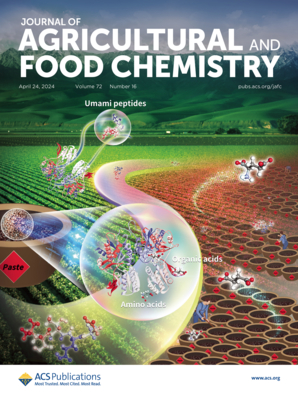Sea Cucumber Fucoidan Inhibits Helicobacter pylori Gastritis via MAPK/NF-κB Signaling and Gut Microbiota Modulation
IF 5.7
1区 农林科学
Q1 AGRICULTURE, MULTIDISCIPLINARY
引用次数: 0
Abstract
Antibiotic-based eradication therapy forHelicobacter pylori faces challenges such as the increasing number of antibiotic-resistant strains and gut microbiota dysbiosis. The study evaluated the effects of fucoidan from sea cucumber cooking liquid (Fuc-SC) on Helicobacter pylori Sydney strain SS1 (Hp SS1)-associated gastritis. The backbone structure of Fuc-SC was composed of alternating → 3)-α-L-Fucp-(1 → 4)-α-L-Fucp-(1 → linked fucose residues. The mouse experiments demonstrated that Fuc-SC reduced the colonization of Hp SS1 in the gastric mucosa through decreasing the level of urease, Hp-IgG, and CagA-IgG. In addition, Fuc-SC regulated oxidative stress levels by reducing NO, MDA, and ROS levels, while increasing the activity of SOD and GSH-Px. Compared to antibiotic treatment alone, the combination of Fuc-SC with antibiotics further enhanced the antioxidant effects. Molecular mechanisms indicated that Fuc-SC regulated the MAPK/NF-κB signaling pathway, downregulating the expression of inflammatory factors such as IL-1β and TNF-α and further modulating the expression of S100A8 and E-cadherin. Gut microbiota analysis indicated that Fuc-SC reversed the depletion of Lactobacillus caused by antibiotic treatment. Additionally, Fuc-SC significantly promoted the biosynthesis of microbial metabolites such as butyric acid, isobutyric acid, hexanoic acid, and phospholipids, thereby alleviating inflammation. These findings highlight its potential as a sustainable, nonantibiotic therapy for Helicobacter pylori-associated gastritis.

海参岩藻聚糖通过MAPK/NF-κB信号传导和肠道菌群调节抑制幽门螺杆菌胃炎
以抗生素为基础的幽门螺杆菌根除治疗面临着诸如抗生素耐药菌株数量增加和肠道菌群失调等挑战。本研究评价了海参蒸煮液中岩藻多糖(fucc - sc)对幽门螺杆菌悉尼菌株SS1 (Hp SS1)相关胃炎的影响。Fuc-SC的主链结构由→3)-α- l - fucp -(1→4)-α- l - fucp -(1→连接的聚焦残基组成。小鼠实验表明,Fuc-SC通过降低脲酶、Hp- igg和CagA-IgG水平,减少Hp SS1在胃粘膜的定植。此外,fucc - sc通过降低NO、MDA和ROS水平,同时提高SOD和GSH-Px的活性来调节氧化应激水平。与单独使用抗生素相比,Fuc-SC与抗生素联合使用可进一步增强抗氧化作用。分子机制提示,Fuc-SC通过调控MAPK/NF-κB信号通路,下调IL-1β、TNF-α等炎症因子的表达,进而调控S100A8、E-cadherin的表达。肠道菌群分析表明,Fuc-SC逆转了抗生素治疗引起的乳酸杆菌的消耗。此外,Fuc-SC显著促进丁酸、异丁酸、己酸和磷脂等微生物代谢物的生物合成,从而减轻炎症。这些发现突出了它作为一种可持续的、非抗生素治疗幽门螺杆菌相关胃炎的潜力。
本文章由计算机程序翻译,如有差异,请以英文原文为准。
求助全文
约1分钟内获得全文
求助全文
来源期刊
CiteScore
9.90
自引率
8.20%
发文量
1375
审稿时长
2.3 months
期刊介绍:
The Journal of Agricultural and Food Chemistry publishes high-quality, cutting edge original research representing complete studies and research advances dealing with the chemistry and biochemistry of agriculture and food. The Journal also encourages papers with chemistry and/or biochemistry as a major component combined with biological/sensory/nutritional/toxicological evaluation related to agriculture and/or food.

 求助内容:
求助内容: 应助结果提醒方式:
应助结果提醒方式:


